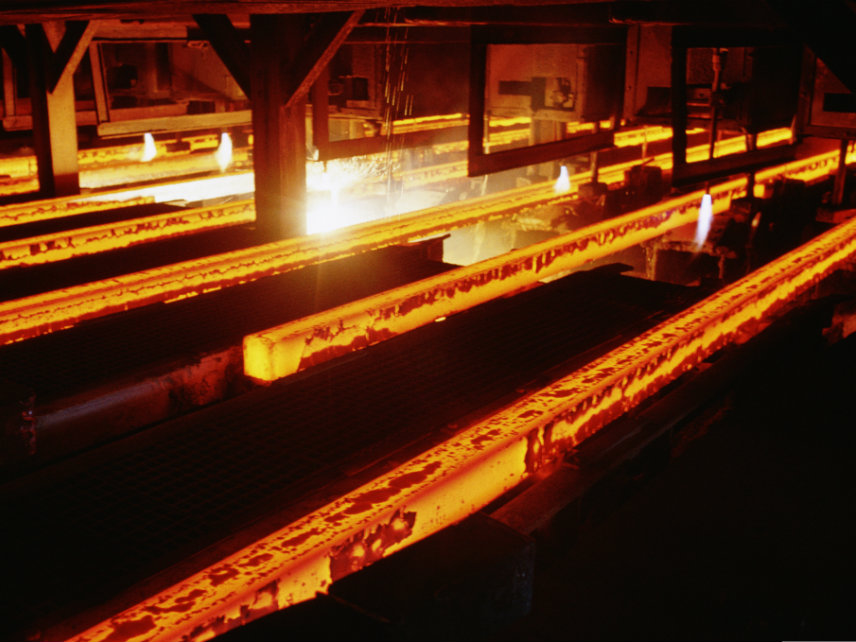U.S. Steel CEO Celebrates Tariffs That Will Help His Industry and Hurt Everyone Else
The benefits of a huge new tariff on steel will be highly concentrated in the steel industry, while the costs will be borne by other parts of the economy.

President Donald Trump could impose massive new tariffs on imported steel as early as Thursday morning, a move that economists say will send shock waves through the American economy, increase prices for American businesses and consumers, cause significant job losses in industries that depend on cheap steel, and, to top it all off, might start an international trade war.
And the head of U.S. Steel is just fine with all that.
David Burritt, CEO of U.S. Steel, announced Wednesday that his company will reopen a shuttered plant if Trump's proposed tariffs are approved.
"We're really excited to be able to tell our employees in the community in Granite City, Illinois, that we will be calling back 500 employees," Burritt said during an appearance on CNBC's Squalk Box show. He praised Trump for showing "courageous leadership" on the tariffs.
Courageous is probably not quite the right word. Trump is steaming ahead with a plan to impose a 25 percent tariff on all foreign steel despite the best efforts from his top economic advisers (one of whom, Gary Cohn, quit this week after seemingly losing the tariff fight), members of his own party in Congress, and some strong signals from the stock market. Trump is also reportedly planning a 10 percent tariff on all imported aluminum.
U.S. Steel is pleased about the tariff, of course, because it will make it more expensive to import foreign steel and boost domestic producers. According to the Commerce Department's report on the proposed tariffs, a 24 percent tariff on all steel imports would be expected to reduce imports by 37 percent. On a smaller scale, the tariff could be a dose of very good news for steelworkers in Granite City, Illinois, who might find themselves heading back to work in the near future.
But the benefits of a huge new tariff on steel will be highly concentrated in the steel industry, while the costs will be borne by many, many other parts of the economy.
According to 2015 Census data, steel mills employed about 140,000 Americans and added about $36 billion to the economy that year, but steel-consuming industries employed more than 6.5 million Americans and added $1 trillion to the economy. In other words, for every steel-producing job in the country that might benefit from Trump's proposed tariffs, there are 46 jobs in steel-consuming jobs—and each of those jobs will get a little shakier if Trump's tariffs become reality.
The last time the federal government imposed sweeping steel tariffs—during George W. Bush's tenure in the White House, when tariffs ranging from 8 percent to 30 percent were set—the higher costs for importing steel dealt a $4 billion hit to the economy and led to 200,000 job losses, the six groups who wrote to the White House argued. Those tariffs were intended to remain in place for three years, but were withdrawn just a year after they were imposed.
It's easy enough to understand why the CEO of U.S. Steel would be in favor of a protectionist policy that helps his business at the expense of everyone else. It's more difficult to understand why the president—or anyone charged with overseeing America's economic policy—could fail to understand the obvious consequences of this action.
But Trump's conservative backers will bend over backwards to make this seem like good news—and to spread economic illiteracy.
Poor Milton Friedman would be puzzled. This wasn't supposed to happen according to his equations https://t.co/0HmrkiNSWB
— Dinesh D'Souza (@DineshDSouza) March 7, 2018
Except, of course, for the fact that Milton Friedman predicted pretty much this exact scenario.
"Decades ago, the Nobel Prize-winning economist Milton Friedman argued that businessmen themselves are among the biggest dangers to a free-market economy," Reason columnist Veronique de Rugy wrote in yesterday's New York Times. "They often seek government privileges to increase their profits and avoid competition. Indeed, import taxes — putting aside rhetoric about defending jobs — are well-known to have devastating effects on consumers. They are quite effective at lining the pockets of shareholders in protected industries."
That's exactly what's happening here. U.S. Steel wins; everyone else loses.


Show Comments (43)